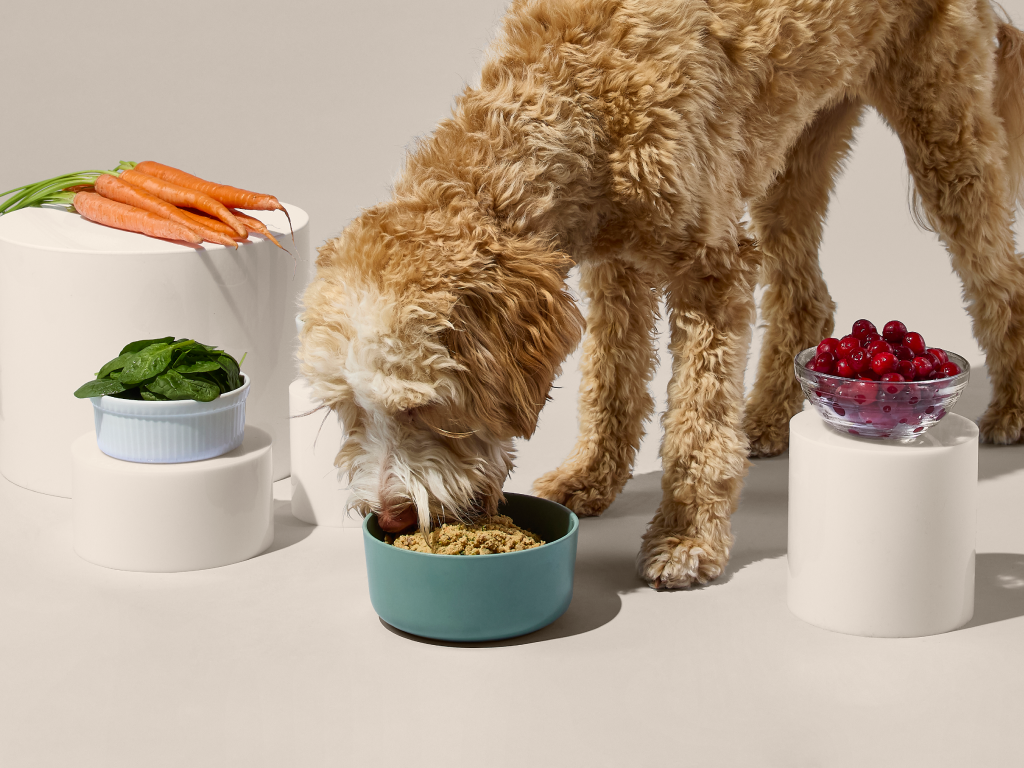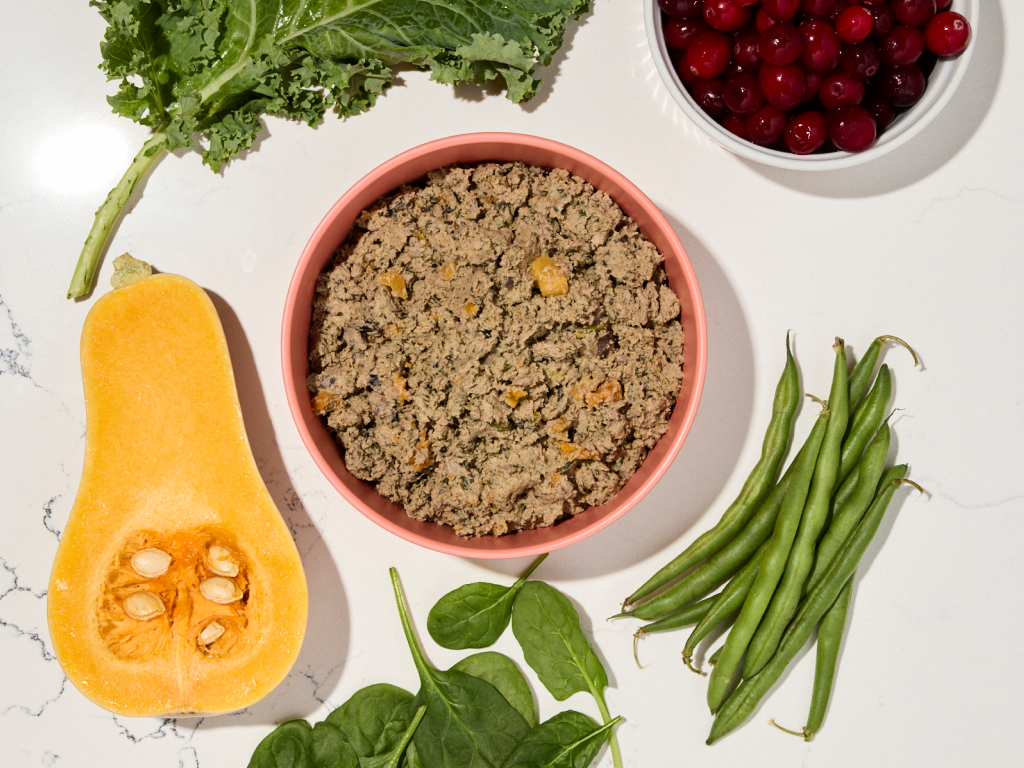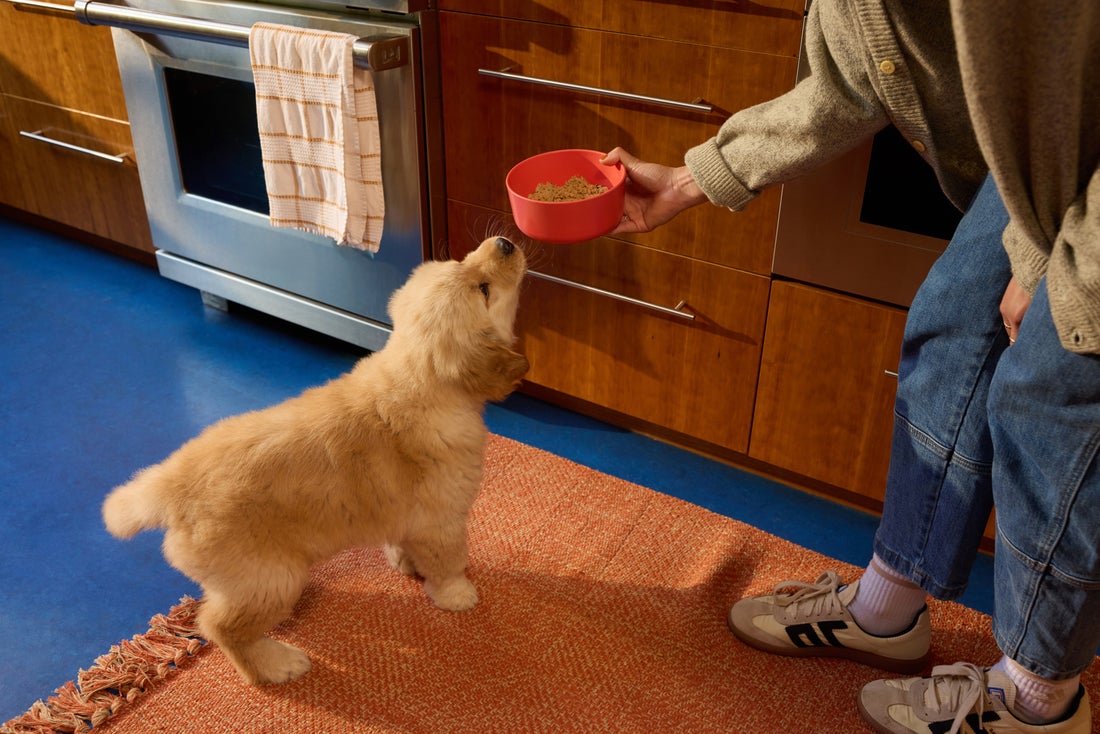Hey Ollie blog readers! We’re offering you an exclusive 60% OFF your starter box! Try now!
Just like humans, dogs can experience food sensitivities, allergies, and digestive issues that affect their overall wellbeing. Considerations around specific dietary restrictions and ingredients can make finding the right food tricky, but we’re here to help. Finding the right food for your dog isn’t just about addressing allergies—it’s about understanding their unique needs to provide them with the best nutrition possible. Read on to get the full scoop.
Understanding Your Dog’s Nutritional Needs
Dogs require a balanced diet containing proteins, carbohydrates, fats, vitamins, and minerals. However, each dog is unique, with specific nutritional requirements based on their:
- Age and life stage
- Size and breed
- Activity level
- Health conditions
- Genetic predispositions
Protein requirements vary significantly depending on your dog’s age and activity level. Puppies need more protein to support growth, while senior dogs may benefit from moderate protein levels that are easier to metabolize[1].
Recognizing Food Sensitivities vs. Allergies
Many pet parents confuse food sensitivities with true allergies. Food allergies in dogs typically manifest as skin issues, including itching, redness, and recurring ear infections. These allergic reactions occur when your dog’s immune system overreacts to specific proteins in their food[1].
Food sensitivities, on the other hand, usually cause digestive upset like vomiting, diarrhea, or excessive gas. These reactions don’t involve the immune system but indicate your dog’s body struggles to process certain ingredients.
Common Allergens in Dog Food
The most frequent food allergens for dogs include:
- Beef
- Dairy
- Chicken
- Wheat
- Soy
- Lamb
- Corn
- Egg
- Pork
- Fish
Contrary to popular belief, grain allergies are relatively rare in dogs. More often, dogs are allergic to animal proteins rather than grains or other plant-based ingredients.
The Benefits of Fresh, Human-Grade Dog Food
When addressing allergies or sensitivities, the quality of ingredients matters tremendously. Fresh, human-grade dog food offers several advantages over conventional kibble.
Superior Ingredient Quality
Human-grade dog food is made with ingredients deemed safe for human consumption and prepared in kitchens that meet human food safety standards. This means higher quality control and better ingredients overall[2].
Fresh dog food typically contains whole food ingredients rather than highly processed alternatives. This means your dog receives nutrition from real meat, vegetables, and fruits rather than meat meals or by-products.
Enhanced Digestibility
Many dogs with sensitive stomachs thrive on fresh food diets because these foods are easier to digest. The cooking methods preserve more nutrients while making the food more digestible for your pup’s system. Fresh food also contains natural enzymes that aid digestion, potentially reducing gastrointestinal issues in sensitive dogs.
Transparency in Ingredients
With fresh, human-grade dog food, what you see is what you get. The ingredient lists are typically shorter and contain recognizable whole foods rather than chemical preservatives or artificial additives that might trigger sensitivities[2].
Tailoring Nutrition to Your Dog’s Life Stage
Your dog’s nutritional needs change throughout their life, requiring adjustments to their diet at different stages.
Puppy Nutrition Fundamentals
Puppies need nutrient-dense food to support their rapid growth and development. Their diets should contain:
- Higher protein levels (22-32% on a dry matter basis)
- More calories per pound of body weight
- Appropriate calcium-to-phosphorus ratio for bone development
- DHA for brain and eye development
Feeding puppies a balanced, high-quality diet from the start helps establish good eating habits and supports proper development.
Adult Dog Dietary Considerations
Adult dogs benefit from balanced nutrition tailored to their activity level and health status. Most adult dogs need:
- Moderate protein levels (18-25% on a dry matter basis)
- Appropriate fat content based on activity level
- Fiber for digestive health
- Antioxidants for immune support
Senior Dog Special Needs
As dogs age, their metabolism slows and their nutritional needs shift. Senior dogs often require:
- Easily digestible proteins
- Joint-supporting nutrients like glucosamine and chondroitin
- Moderate fat levels to prevent weight gain
- Added fiber for digestive health
- Antioxidants for cellular health
How Personalized Nutrition Plans Benefit Dogs with Special Needs
Dogs with allergies, sensitivities, or health conditions benefit tremendously from personalized nutrition plans that take their specific needs into account.
The Elimination Diet Approach
For dogs with suspected food allergies, veterinarians often recommend an elimination diet to identify the problematic ingredients. This process involves:
- Feeding a limited-ingredient diet with novel protein sources
- Strictly avoiding all other foods and treats for 8-12 weeks
- Gradually reintroducing potential allergens one at a time
- Monitoring for reactions to identify specific triggers
This methodical approach helps pinpoint exactly which ingredients cause reactions in your dog.
Customized Meal Plans
Customized meal plans take into account your dog’s:
- Weight and body condition
- Activity level
- Known allergies or sensitivities
- Health conditions
- Breed-specific needs
- Taste preferences
By tailoring portions and ingredients to your specific dog, these plans help address multiple health concerns simultaneously while ensuring optimal nutrition.
How Ollie Addresses Specialized Nutritional Needs
Ollie creates personalized meal plans designed specifically for your dog’s unique nutritional requirements. By gathering detailed information about your dog’s age, weight, breed, activity level, and health concerns, Ollie can formulate the perfect meal plan[1] [3].
Human-Grade Ingredients
Ollie uses human-grade ingredients prepared in USDA-inspected kitchens. This means all ingredients meet human food safety standards, providing superior nutrition for your dog[2]. The recipes feature whole foods like real meat, fresh vegetables, and fruits, minimizing the risk of reactions to artificial additives or low-quality ingredients that often trigger sensitivities.
Portion Control and Delivery Convenience
Each meal comes pre-portioned based on your dog’s caloric needs, helping maintain a healthy weight while providing optimal nutrition. The subscription-based delivery service ensures you never run out of fresh food for your pup[4]. Ollie’s flexible delivery schedule allows you to receive meals on a regular basis that works for your lifestyle, making it easier to maintain consistent nutrition for your dog.
Transitioning Your Dog to a New Diet
When introducing any new food to your dog, a gradual transition is essential to prevent digestive upset.
The 7-Day Transition Method
- Days 1-2: 75% old food, 25% new food
- Days 3-4: 50% old food, 50% new food
- Days 5-6: 25% old food, 75% new food
- Day 7: 100% new food
Dogs with sensitive stomachs may need an even more gradual transition, extending the process to 10-14 days.
Monitoring for Improvement
When transitioning to address allergies or sensitivities, keep track of:
- Changes in stool quality
- Skin condition improvements
- Energy levels
- Appetite and interest in food
- Any signs of digestive upset
Most dogs show improvement within 4-6 weeks on a new diet, though some skin conditions may take longer to resolve completely.
Making the Right Choice for Your Dog
Finding the perfect food for your dog involves considering multiple factors, including:
- Your dog’s specific health needs
- Your budget and lifestyle
- Food quality and ingredient transparency
- Convenience factors like delivery options
The best food is one that meets your dog’s nutritional needs while fitting into your lifestyle and budget. For many pet parents, subscription-based fresh food services like Ollie provide an ideal balance of quality, convenience, and customization[3] [4].
Conclusion
Living well starts with eating well, and understanding your dog’s unique health and nutrition needs can help positively impact their overall quality of life. Expertly balanced fresh nutrition plans offer significant benefits for dogs with special dietary needs, providing high-quality nutrition without unnecessary fillers or additives. Whether your dog has allergies, sensitivities, or you’re just looking to give them the best nutrition possible, exploring fresh food options like Ollie can make a meaningful difference in their health and happiness.
Citations
[2]https://www.myollie.com/about/
Tagged As:

The nutrition your dog needs,
the food they want.

Enjoying our articles? Subscribe our Newsletters and get new articles directly to your inbox
You might also like
29 September 2025
6 MINS READ
How Is Fresh Dog Food Made?
Unlike standard kibble that undergoes high-heat processing, fresh dog food maintains the natural integrity of ingredients while avoiding artificial additives and fillers. But what exactly goes int…
by Ollie Pets
29 September 2025
7 MINS READ
Is Lamb a Good Protein for Sensitive Stomachs?
Lamb provides significant nutritional benefits for dogs, particularly for pups with sensitive stomachs who need a specialized diet. This protein-rich meat offers an excellent alternative for pups …
by Ollie Pets
29 September 2025
7 MINS READ
Top 10 Fresh Ingredients for Your New Puppy’s Bowl
As dog parents, we naturally want to provide our pups with a strong start in life. This means giving them nutrition that is able to support their rapid growth, abundant energy, and developing immu…
by Ollie Pets







